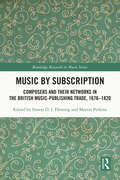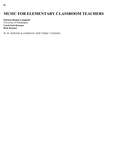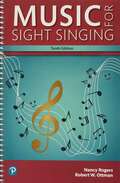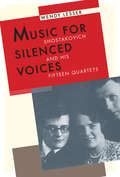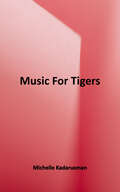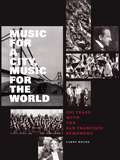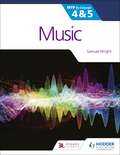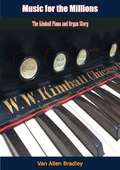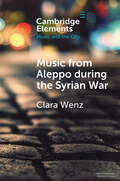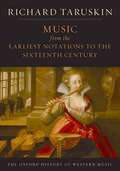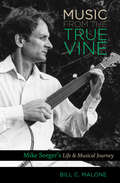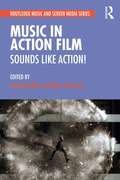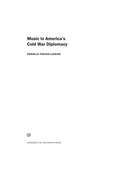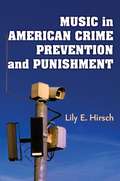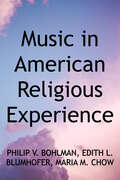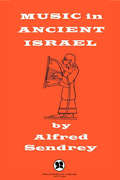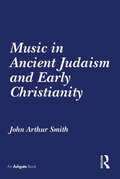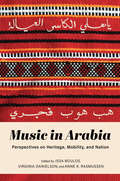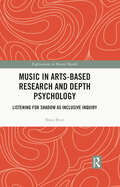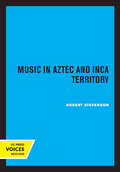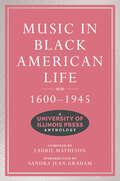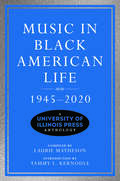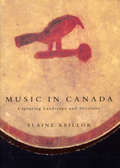- Table View
- List View
Music by Subscription: Composers and their Networks in the British Music-Publishing Trade, 1676–1820 (Routledge Research in Music)
by Simon D. I. Fleming Martin PerkinsThis book breaks new ground in the social and cultural history of eighteenth-century music in Britain through the study of a hitherto neglected resource, the lists of subscribers that were attached to a wide variety of publications, including musical works. These lists shed considerable light on the nature of those who subscribed to music, including their social status, place of employment, residence, and musical interests. Through broad analysis of subscription data, the contributors reveal insights into social and economic changes during the period, and the types of music favoured by groups like music clubs, the aristocracy, the clergy, and by men and women. With chapters on female composers and listeners, music and the slave economy, musical patronage, the print trade, and nationality, this book provides innovative perspectives that enhance our understanding of music’s social spheres, the emergence of music publishing, and the potential of digital musicology research.
Music for Elementary Classroom Teachers
by Patricia Shehan Campbell Carol Scott-Kassner Kirk KassnerLearn how to use the power of music to enhance other subjects. Written for both elementary education majors and K-6 classroom teachers, the text is rooted in cognitive research on children’s development. <p><p>The book offers myriad instructional plans that weave songs, dances, and carefully constructed listening experiences into subjects ranging from language arts and social studies to mathematics, science, and the arts. It also provides opportunities for engaging children in expressive-creative practices.
Music for Sight Singing
by Nancy Rogers Robert OttmanFor courses in sight singing and music theory. The most celebrated, engaging, and musical sight-singing text on the market A freshly updated edition of the classic musical textbook, Music for Sight Singing, 10th Edition, is structured around organized melodies, drawn from the literature of composed music and a wide range of the world’s folk music. Real music exercises allow readers to practice sight singing and develop their “mind’s ear,” the ability to imagine how music sounds without first playing it on an instrument. The new edition includes even more melodies and several new topics; improved introductions to minor keys, pre-dominant leaps, and chromaticism; and increased use of bass and C clefs ― while retaining the simple-to-complex arrangement that lays the foundation for success.
Music for Silenced Voices: Shostakovich and His Fifteen Quartets
by Wendy LesserMost previous books about Dmitri Shostakovich have focused on either his symphonies and operas, or his relationship to the regime under which he lived, or both, since these large-scale works were the ones that attracted the interest and sometimes the condemnation of the Soviet authorities. Music for Silenced Voiceslooks at Shostakovich through the back door, as it were, of his fifteen quartets, the works which his widow characterized as a "diary, the story of his soul. " The silences and the voices were of many kinds, including the political silencing of adventurous writers, artists, and musicians during the Stalin era; the lost voices of Shostakovich's operas (a form he abandoned just before turning to string quartets); and the death-silenced voices of his close friends, to whom he dedicated many of these chamber works. Wendy Lesser has constructed a fascinating narrative in which the fifteen quartets, considered one at a time in chronological order, lead the reader through the personal, political, and professional events that shaped Shostakovich's singular, emblematic twentieth-century life. Weaving together interviews with the composer's friends, family, and colleagues, as well as conversations with present-day musicians who have played the quartets, Lesser sheds new light on the man and the musician. One of the very few books about Shostakovich that is aimed at a general rather than an academic audience,Music for Silenced Voicesis a pleasure to read; at the same time, it is rigorously faithful to the known facts in this notoriously complicated life. It will fill readers with the desire to hear the quartets, which are among the most compelling and emotionally powerful monuments of the past century's music.
Music for Tigers
by Michelle Kadarusman“Middle-school student Louisa wants to spend the summer practicing violin for a place in the youth symphony, but is instead sent to the Tasmanian rain forest camp of her Australian relatives. There she learns that her family secretly protects the last of the supposedly extinct Tasmanian tigers. When an encroaching mining operation threatens the hidden sanctuary, Louisa realizes her music can help” - Provided by publisher.
Music for a City Music for the World
by Larry RotheIn Music for a City, Music for the World, Larry Rothe shares how the San Francisco Bay Area's love of music, rooted in the Gold Rush, gave birth to a Grammy-winning and internationally acclaimed orchestra. Released in time for the San Francisco Symphony's celebration of its 100th anniversary, this definitive history replete with hundreds of archival photos and images gives readers a behind-the-scenes glimpse into one of the world's foremost orchestras and, in so doing, illuminates the cultural life of a city.
Music for the IB MYP 4&5: MYP by Concept
by Samuel WrightA concept-driven and assessment -focused approach to Music teaching and learning.- Approaches each chapter with statements of inquiry framed by key and related concepts, set in a global context.- Supports every aspect of assessment using tasks designed by an experienced MYP educator.- Differentiates and extends learning with research projects and interdisciplinary opportunities.- Applies global contexts in meaningful ways to offer an MYP Music programme with an internationally-minded perspective.Also available Student eTextbook 9781510475533Whiteboard eTextbook 9781510475540Teacher's Pack 9781510478145
Music for the IB MYP 4&5: MYP by Concept
by Samuel WrightA concept-driven and assessment -focused approach to Music teaching and learning.- Approaches each chapter with statements of inquiry framed by key and related concepts, set in a global context.- Supports every aspect of assessment using tasks designed by an experienced MYP educator.- Differentiates and extends learning with research projects and interdisciplinary opportunities.- Applies global contexts in meaningful ways to offer an MYP Music programme with an internationally-minded perspective.Also available Student eTextbook 9781510475533Whiteboard eTextbook 9781510475540Teacher's Pack 9781510478145
Music for the Millions: The Kimball Piano and Organ Story
by Van Allen BradleyIn Music for the Millions, author Van Allen Bradley tells the story of a firm which, at the time of this book’s original publication in 1962, had endured for 100 years.But the Kimball Piano and Organ Company accomplished more than simply surviving a century—it played a dominant role in the development of the industry of which it was a part.The company started as a piano dealership in Chicago in 1857 as W.W. Kimball and Company by William Wallace Kimball (1828-1904). In 1864, Kimball moved from its earliest location in the corner of a jewelry store to sales rooms in the Crosby Opera House. The Great Chicago Fire destroyed all of Kimball’s commercial assets in 1871, but he continued selling from his home, and rebuilt his dealership business.In 1877, W.W. Kimball began assembling its own reed organs, and after three years the company began offering organs made entirely in-house. In 1882, the Kimball company was incorporated, and an expansive factory was built to produce reed organs; soon, the factory was producing 15,000 organs a year—the world’s largest organ maker.In 1887, Kimball began building a five-story factory for making its own pianos, and the next year produced 500 instruments of indifferent quality. By 1893 at the World’s Columbian Exposition, at which Kimball received the “Worlds Columbian Exposition Award,” Kimball was known for high quality, efficiency in manufacture, and aggressive sales practices, using 35-40 traveling salesmen to cover cities and remote areas.In 1959, the W.W. Kimball Company was purchased from the last remaining Kimball family heir by Mr. Arnold F. Habig and became a wholly owned subsidiary of The Jasper Corporation. Piano production was relocated to the small, southern Indiana town of West Baden, Indiana, where the company was rejuvenated and once again began to grow—10 years after the purchase, Kimball was once again the world’s largest piano company.
Music from Aleppo during the Syrian War: Displacement and Memory in Hello Psychaleppo's Electro-Tarab (Elements in Music and the City)
by Clara WenzAleppo is regarded as one of the historical centres of an urban Arab art music tradition known as 'tarab'. During the war that followed Syria's 2011 political uprisings, vast parts of the city were destroyed. This Element explores how 'tarab' lives on in new contexts. It does so through a focus on the work of Hello Psychaleppo, one of Aleppo's displaced musicians and the pioneer of 'electro-tarab', an eclectic style of urban electronic dance music that is conceived as a homage to Aleppo's musical legacy. Whether local religious chants, Palestinian poetry, or the image of a yellow man, electro-tarab includes an inventory of audio, visual and literary samples. These samples help conceptualise the role music has played during the Syrian war; they offer insights into Aleppo's musical and diasporic afterlife; and they illuminate some of the socio-aesthetic parameters that characterise contemporary Arab electronic music.
Music from a Landfill (Fountas & Pinnell Classroom, Guided Reading Grade 3)
by Laura JohnsonNIMAC-sourced textbook
Music from the Earliest Notations to the Sixteenth Century: The Oxford History of Western Music
by Richard TaruskinThe universally acclaimed and award-winning Oxford History of Western Music is the eminent musicologist Richard Taruskin's provocative, erudite telling of the story of Western music from its earliest days to the present. Each book in this superlative five-volume set illuminates-through a representative sampling of masterworks- the themes, styles, and currents that give shape and direction to a significant period in the history of Western music. <p><p>This first volume in Richard Taruskin's majestic history, Music from the Earliest Notations to the Sixteenth Century , sweeps across centuries of musical innovation to shed light on the early forces that shaped the development of the Western classical tradition. Beginning with the invention of musical notation more than a thousand years ago, Taruskin addresses topics such as the legend of Saint Gregory and Gregorian chant, Augustine's and Boethius's thoughts on music, the liturgical dramas of Hildegard of Bingen, the growth of the music printing business, the literary revolution and the English madrigal, the influence of the Reformation and the Counter-Reformation, and the operas of Monteverdi. Laced with brilliant observations, memorable musical analysis, and a panoramic sense of the interactions between history, culture, politics, art, literature, religion, and music, this book will be essential reading for anyone who wishes to understand this rich and diverse period.
Music from the True Vine: Mike Seeger's Life and Musical Journey
by Bill C. MaloneA musician, documentarian, scholar, and one of the founding members of the influential folk revival group New Lost City Ramblers, Mike Seeger (1933-2009) spent more than fifty years collecting, performing, and commemorating the culture and folk music of white and black southerners, which he called "music from the true vine. " In this fascinating biography, Bill Malone explores the life and musical contributions of folk artist Seeger, son of musicologists Charles and Ruth Crawford Seeger and brother of folksingers Pete and Peggy Seeger. Malone argues that Seeger, while not as well known as his brother, may be more important to the history of American music through his work in identifying and giving voice to the people from whom the folk revival borrowed its songs. Seeger recorded and produced over forty albums, including the work of artists such as Libba Cotton, Tommy Jarrell, Dock Boggs, and Maybelle Carter. In 1958, with an ambition to recreate the southern string bands of the twenties, he formed the New Lost City Ramblers, helping to inspire the urban folk revival of the sixties. Music from the True Vinepresents Seeger as a gatekeeper of American roots music and culture, showing why generations of musicians and fans of traditional music regard him as a mentor and an inspiration.
Music in Action Film: Sounds Like Action!
by James Buhler Mark DurrandMusic in Action Film is the first volume to address the central role of music and sound in action film—arguably the most dominant form of commercial cinema today. Bringing together 15 essays by established and emerging scholars, the book encompasses both Hollywood blockbusters and international films, from classic works such as The Seven Samurai to contemporary superhero franchises. The contributors consider action both as genre and as a mode of cinematic expression, in chapters on evolving musical conventions; politics, representation, and identity; musical affect and agency; the functional role of music and sound design in action film; and production technologies. Breaking new critical ground yet highly accessible, this book will be of interest to students and scholars of music and film studies.
Music in America's Cold War Diplomacy
by Danielle Fosler-LussierDuring the Cold War, thousands of musicians from the United States traveled the world, sponsored by the U.S. State Department's Cultural Presentations program. Performances of music in many styles--classical, rock 'n' roll, folk, blues, and jazz--competed with those by traveling Soviet and mainland Chinese artists, enhancing the prestige of American culture. These concerts offered audiences around the world evidence of America's improving race relations, excellent musicianship, and generosity toward other peoples. Through personal contacts and the media, musical diplomacy also created subtle musical, social, and political relationships on a global scale. Although born of state-sponsored tours often conceived as propaganda ventures, these relationships were in themselves great diplomatic achievements and constituted the essence of America's soft power. Using archival documents and newly collected oral histories, Danielle Fosler-Lussier shows that musical diplomacy had vastly different meanings for its various participants, including government officials, musicians, concert promoters, and audiences. Through the stories of musicians from Louis Armstrong and Marian Anderson to orchestras and college choirs, Fosler-Lussier deftly explores the value and consequences of "musical diplomacy."
Music in American Crime Prevention and Punishment
by Hirsch Lily E.Although the use of music for extramusical purposes has been a part of American culture for some time, the phenomenon remained largely unknown to the general public until revelations became widespread of startling military practices during the second Iraq War. In Music in American Crime Prevention and Punishment, Lily E. Hirsch explores the related terrain at the intersection of music and law, demonstrating the ways in which music has become a tool of law enforcement and justice through: police and community leaders’ use of classical music in crime deterrence and punishment; the use of rap lyrics as prosecutorial evidence; allegations of music as incitement to violence; and the role of music in U. S. prisons and in detention centers in Guantanamo, Iraq, and Afghanistan. In the course of her study, Hirsch asks several questions: How does the law treat music? When and why does music participate in the law? How does music influence the legal process? How does the legal process influence music? And how do these appropriations affect the Romantic ideals underlying our view of music?
Music in American Religious Experience
by Philip V. Bohlman Edith L. Blumhofer Maria M. ChowSince the appearance of The Bay Psalm Book in 1640, music has served as a defining factor for American religious experience and has been of fundamental importance in the development of American identity and psyche. The essays in this long-awaited volume explore the diverse ways in which music shapes the distinctive presence of religion in the United States and address the fullness of music's presence in American religious history. <p><p>Timely, challenging, and stimulating, this collection will appeal to students and scholars of American history, American studies, religious studies, theology, musicology, and ethnomusicology, as well as to practicing sacred musicians.
Music in Ancient Israel
by Alfred SendreyThis work is a comprehensive treatment of the music of Biblical and early Talmudic times. It is thoroughly documented, setting forth the origins, forms and ethos of Hebrew music. It draws upon the most recent archaeological discoveries and contemporary Biblical research, dealing not only with sacred music, but also the broad field of ancient secular music which up to now has been only dimly comprehended. Of special interest to the Christian world in this period of ecumenical discussion is the clarity with which Dr. Sendrey interprets the common musical legacy shared between Judaism and Christianity. Dr. Sendrey is Professor of Musicology at the University of Judaism in Los Angeles and is widely known in the world of musicology for his important Bibliography of Jewish Music, published by Columbia University Press (1951). This work is today the primary source book for Jewish music research and is used throughout the world. Alfred Sendrey was a Hungarian-American conductor and composer. A pupil of Koessler at the Budapest Academy (1901-5), he worked in Germany, the USA and Austria as an opera conductor, (also of the Leipzig SO, 1924-32), then moved to Paris (1933-40) and finally to the USA, where he completed his studies of Jewish music.
Music in Ancient Judaism and Early Christianity
by John Arthur SmithIn Music in Ancient Judaism and Early Christianity, John Arthur Smith presents the first full-length study of music among the ancient Israelites, the ancient Jews and the early Christians in the Mediterranean lands during the period from 1000 BCE to 400 CE. He considers the physical, religious and social setting of the music, and how the music was performed. The extent to which early Christian music may have retained elements of the musical tradition of Judaism is also considered. After reviewing the subject's historical setting, and describing the main sources, the author discusses music at the Jerusalem Temple and in a variety of spheres of Jewish life away from it. His subsequent discussion of early Christian music covers music in private devotion, monasticism, the Eucharist, and gnostic literature. He concludes with an examination of the question of the relationship between Jewish and early Christian music, and a consideration of the musical environments that are likely to have influenced the formation of the earliest Christian chant. The scant remains of notated music from the period are discussed and placed in their respective contexts. The numerous sources that are the foundation of the book are evaluated objectively and critically in the light of modern scholarship. Due attention is given to where their limitations lie, and to what they cannot tell us as well as to what they can. The book serves as a reliable introduction as well as being an invaluable guide through one of the most complex periods of music history.
Music in Arabia: Perspectives on Heritage, Mobility, and Nation
by David A. McDonald Ruth M. Stone Jean Lambert Scheherazade Hassan Ghazi Al-Mulaifi Ahmad AlSalhi Aisha Bilkhair Yassine Ayari Majid H. al-Harthy Kay Hardy Campbell Khalid Albudoor Anne Van Oostrum Musallam Al-Kathiri George MürerMusic in Arabia extends and challenges existing narratives of the region's distinctive but understudied music to reveal diverse and dynamic music cultures rooted in centuries-old heritage.Contributors to Music in Arabia bring a critical eye and ear to the contemporary soundscape, musical life, and expressive culture in the Gulf region. Including work by leading scholars and local authorities, this collection presents fresh perspectives and new research addressing why musical expression is fundamental to the area's diverse, transnational communities. The volume also examines music circulation as a commodity, such as with the production of early recordings, the transnational music industry, the context of the Arab Spring, and the region's popular music markets. As a bonus, readers can access a linked website containing audiovisual examples of the music, dance, and expressive culture introduced throughout the book. With the work of resident scholars and heritage practitioners in conversation with that of researchers from the United States and Europe, Music in Arabia offers both context and content to clarify how music articulates identity and nation among multiethnic, multiracial, and multinational populations.
Music in Arts-Based Research and Depth Psychology: Listening for Shadow as Inclusive Inquiry (ISSN)
by Shara BrunThis book addresses an existing gap in academic arts-based research, whereby, rather than exploring music as an effective therapeutic intervention, it is explored as the central medium or tool of inquiry.Integrating heuristic, hermeneutic, and arts-based grounded theory methodologies, the book conceptualizes and describes the practice of Sonic Stretching as an in-depth example of using sound as an effective and systematic research tool. Stemming from evidence-based insights, the book explores and explains ways in which music and sound can be utilized in arts-based research (ABR) in all disciplines, as opposed to only being used among professional musicians and those operating within music studies. It points to some of the obstacles that have previously prevented this from happening more broadly and, in doing so, aims to help bridge the conspicuous gap in ABR studies, where music and sonic imagination should be.Offering a clear and well-presented example for integrating music and sound into processes of depth psychological inquiry and addressing the impact of colonialization upon embodied knowledge in music and academic research, it will appeal to scholars and researchers working at the intersection of psychology, music studies, education, social justice, and research methods.
Music in Aztec and Inca Territory
by Robert M. StevensonThis title is part of UC Press's Voices Revived program, which commemorates University of California Press’s mission to seek out and cultivate the brightest minds and give them voice, reach, and impact. Drawing on a backlist dating to 1893, Voices Revived makes high-quality, peer-reviewed scholarship accessible once again using print-on-demand technology. This title was originally published in 1976.
Music in Black American Life, 1600-1945: A University of Illinois Press Anthology (Music in American Life)
by Charles Wolfe Eileen Southern Harriet Ottenheimer Stephen Wade Katrina Dyonne Thompson Robert M. Marovich Sandra Jean Graham Samuel A. Floyd Jeffrey Magee Rae Linda Brown Laurie Matheson R. Reid BadgerThis first volume of Music in Black American Life collects research and analysis that originally appeared in the journals American Music and the Black Music Research Journal, and in the University of Illinois Press's acclaimed book series Music in American Life. In these selections, experts from a cross-section of disciplines engage with fundamental issues in ways that changed our perceptions of Black music. The topics includes the culturally and musically complex Black music-making of colonial America; string bands and other lesser-known genres practiced by Black artists; the jubilee industry and its audiences; and innovators in jazz, blues, and Black gospel. Eclectic and essential, Music in Black American Life, 1600–1945 offers specialists and students alike a gateway to the history and impact of Black music in the United States. Contributors: R. Reid Badger, Rae Linda Brown, Samuel A. Floyd Jr., Sandra Jean Graham, Jeffrey Magee, Robert M. Marovich, Harriet Ottenheimer, Eileen Southern, Katrina Dyonne Thompson, Stephen Wade, and Charles Wolfe
Music in Black American Life, 1945-2020: A University of Illinois Press Anthology (Music in American Life)
by Nelson George Sherrie Tucker Claudrena N. Harold Loren Kajikawa Robin D. Kelley Mark Tucker Eileen M. Hayes Wayne Everett Goins Tammy L. Kernodle Laurie Matheson Cheryl L. Keyes Gwendolyn D Pough Bernice Johnson ReagonThis second volume of Music in Black American Life offers research and analysis that originally appeared in the journals American Music and Black Music Research Journal, and in two book series published by the University of Illinois Press: Music in American Life, and African American Music in Global Perspective. In this collection, a group of predominately Black scholars explores a variety of topics with works that pioneered new methodologies and modes of inquiry for hearing and studying Black music. These extracts and articles examine the World War II jazz scene; look at female artists like gospel star Shirley Caesar and jazz musician-arranger Melba Liston; illuminate the South Bronx milieu that folded many forms of black expressive culture into rap; and explain Hamilton's massive success as part of the "tanning" of American culture that began when Black music entered the mainstream. Part sourcebook and part survey of historic music scholarship, Music in Black American Life, 1945–2020 collects groundbreaking work that redefines our view of Black music and its place in American music history. Contributors: Nelson George, Wayne Everett Goins, Claudrena N. Harold, Eileen M. Hayes, Loren Kajikawa, Robin D. G. Kelley, Tammy L. Kernodle, Cheryl L. Keyes, Gwendolyn Pough, Bernice Johnson Reagon, Mark Tucker, and Sherrie Tucker
Music in Canada
by Elaine KeillorKwakwaka'wakw welcome songs, an aria from Joseph Quesnel's 1808 opera Lucas et Cécile, rubbaboos (a combination of elements from First Peoples, French, and English music), the Tin Pan Alley hits of Shelton Brooks, and the contemporary work of Claude Vivier and Blue Rodeo all dance together in Canada's rich musical heritage. Elaine Keillor offers an unprecedented history of Canadian musical expressions and their relationship to Canada's great cultural and geographic diversity. A survey of "musics" in Canada - the country's multiplicity of musical genres and rich heritage - is complemented by forty-three vignettes highlighting topics such as Inuit throat games, the music of k.d. lang, and orchestras in Victoria. Music in Canada illuminates the past but also looks to the future to examine the context within which Canadian music began and continues to develop. A CD by the author of previously unrecorded Canadian music is included.
